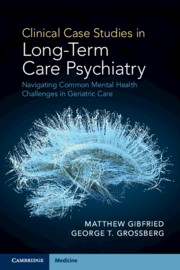 Clinical Case Studies in Long-Term Care Psychiatry
Clinical Case Studies in Long-Term Care Psychiatry Book contents
- Clinical Case Studies in Long-Term Care Psychiatry
- Clinical Case Studies in Long-Term Care Psychiatry
- Copyright page
- Contents
- Preface
- Section 1 Neurocognitive Disorders
- Case 2 “I Think I Hit My Head”
- Case 3 “It’s like She’s a Different Person”
- Case 4 “I Am Tired All the Time”
- Case 5 “I Am Okay”
- Case 6 “Leave Me Alone”
- Case 7 “I Am Fine”
- Case 8 “Those Children Are Cute”
- Case 9 “Those Terrible Men Have Left”
- Case 10 “I Saw the Heavenly Gates”
- Case 11 “Leave Me Alone”
- Section 2 Mood Disorders
- Case 13 “My Mom Looks Like a Zombie!”
- Case 14 “My Soul Is in England”
- Case 15 “I Feel Terrible”
- Case 16 “I Don’t Care”
- Case 17 “I Feel Very Lonely”
- Case 18 “I Don’t Feel Right”
- Case 19 “I Am Feeling Great”
- Case 20 “I Am Staying Here Illegally”
- Section 3 Psychotic Disorders
- Case 22 “He Just Won’t Get Up”
- Case 23 “My Body Is Being Taken over by a Fungus!”
- Case 24 “This Is Humiliating”
- Case 25 “I Want to Go Home”
- Case 26 “I Am a Worrier”
- Case 27 “Get out of My House”
- Section 4 Anxiety and Related Disorders
- Case 29 “My Vision Has Been Worsening in the Last Two Weeks”
- Case 30 “I Am Not Addicted to Valium”
- Case 31 “Of Course, I Worry about Him”
- Case 32 “Bombs Are Falling! Run, Run!”
- Section 5 Substance Abuse Disorders
- Section 6 Personality Disorders
- Case 35 “I Cannot Wait to Get out of This Miserable Place”
- Section 7 Miscellaneous Neuropsychiatric Disorders Affecting Patients in Long-Term Care
- Case 37 “Everyone Is Just So Good to Me!”
- Case 38 “Why Do They Say I Have Dementia?”
- Case 39 “I Hate That Guy … I Can’t Get Any Sleep!”
- Case 40 “Just One Kiss”
- Case 41 “I Don’t Feel Well”
- Case 42 “I Like Food”
- Case 43 “I Like the Way She Laughs”
- Case 44 “This Is So Hard”
- Index
- References
Case 42 - “I Like Food”
Binge Eating Disorder
Published online by Cambridge University Press: 31 October 2024
- Clinical Case Studies in Long-Term Care Psychiatry
- Clinical Case Studies in Long-Term Care Psychiatry
- Copyright page
- Contents
- Preface
- Section 1 Neurocognitive Disorders
- Case 2 “I Think I Hit My Head”
- Case 3 “It’s like She’s a Different Person”
- Case 4 “I Am Tired All the Time”
- Case 5 “I Am Okay”
- Case 6 “Leave Me Alone”
- Case 7 “I Am Fine”
- Case 8 “Those Children Are Cute”
- Case 9 “Those Terrible Men Have Left”
- Case 10 “I Saw the Heavenly Gates”
- Case 11 “Leave Me Alone”
- Section 2 Mood Disorders
- Case 13 “My Mom Looks Like a Zombie!”
- Case 14 “My Soul Is in England”
- Case 15 “I Feel Terrible”
- Case 16 “I Don’t Care”
- Case 17 “I Feel Very Lonely”
- Case 18 “I Don’t Feel Right”
- Case 19 “I Am Feeling Great”
- Case 20 “I Am Staying Here Illegally”
- Section 3 Psychotic Disorders
- Case 22 “He Just Won’t Get Up”
- Case 23 “My Body Is Being Taken over by a Fungus!”
- Case 24 “This Is Humiliating”
- Case 25 “I Want to Go Home”
- Case 26 “I Am a Worrier”
- Case 27 “Get out of My House”
- Section 4 Anxiety and Related Disorders
- Case 29 “My Vision Has Been Worsening in the Last Two Weeks”
- Case 30 “I Am Not Addicted to Valium”
- Case 31 “Of Course, I Worry about Him”
- Case 32 “Bombs Are Falling! Run, Run!”
- Section 5 Substance Abuse Disorders
- Section 6 Personality Disorders
- Case 35 “I Cannot Wait to Get out of This Miserable Place”
- Section 7 Miscellaneous Neuropsychiatric Disorders Affecting Patients in Long-Term Care
- Case 37 “Everyone Is Just So Good to Me!”
- Case 38 “Why Do They Say I Have Dementia?”
- Case 39 “I Hate That Guy … I Can’t Get Any Sleep!”
- Case 40 “Just One Kiss”
- Case 41 “I Don’t Feel Well”
- Case 42 “I Like Food”
- Case 43 “I Like the Way She Laughs”
- Case 44 “This Is So Hard”
- Index
- References
Summary
Eating disorders are complex chronic medical conditions that have both psychological and medical consequences. They are characterized by abnormal eating behaviors that can lead to significant morbidity and even mortality. The pathophysiology of binge eating disorder involves both biological and psychological factors. Just as in substance use disorders, dysregulation in neurocircuitry related to reward and emotional processing might contribute to the development and maintenance of binge eating behavior. Pharmacologic treatment options for binge eating disorder have provided disappointing results. Comorbid mood and anxiety disorders are more common in this population and treatment of these conditions may produce related improvements in comorbid eating disorders. Ethical challenges can present themselves when dealing with those with eating disorders in long-term care settings. Patients in long-term care settings have as much right to engage in legal, albeit self-destructive, behaviors as those outside of long-term care.
Keywords
- Type
- Chapter
- Information
- Clinical Case Studies in Long-Term Care PsychiatryNavigating Common Mental Health Challenges in Geriatric Care, pp. 211 - 215Publisher: Cambridge University PressPrint publication year: 2024
